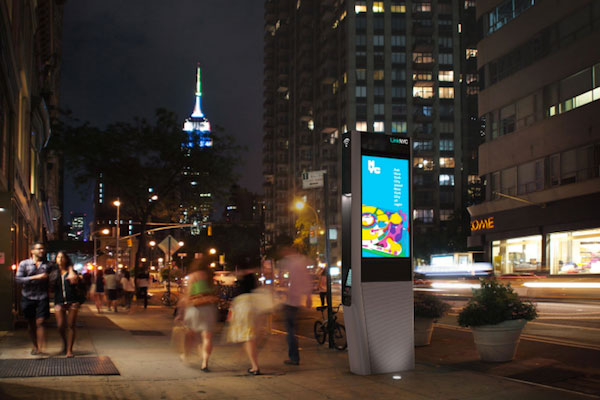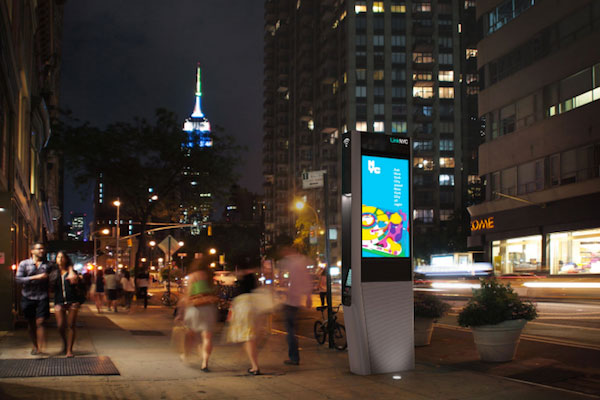New York City will turn all of its payphones into free, high-speed wifi hotspots


A free daily email with the biggest news stories of the day – and the best features from TheWeek.com
You are now subscribed
Your newsletter sign-up was successful
In most cities, payphones are a zombified anachronism of the urban landscape — a place where someone can duck in to get out of the sidewalk crowd, escape the weather, and...make a cellphone call. New York City, on the other hand, sees phone booths as the perfect place to start a communication revolution.
Under a new program called LinkNYC, the city has announced plans to remove 8,400 payphones and replace them with 10,000 kiosks providing free high-speed wifi, free domestic phone call service, and even charging stations:

(LinkNYC)
The Week
Escape your echo chamber. Get the facts behind the news, plus analysis from multiple perspectives.

Sign up for The Week's Free Newsletters
From our morning news briefing to a weekly Good News Newsletter, get the best of The Week delivered directly to your inbox.
From our morning news briefing to a weekly Good News Newsletter, get the best of The Week delivered directly to your inbox.
Users within 150 feet of a kiosk will enjoy 1 gigabyte-per-second internet speeds — meaning a two-hour movie could be downloaded in about 30 seconds. The $200 million project — to be built and maintained by a consortium of tech companies dubbed CityBridge — will be paid for entirely with digital advertising sold on the kiosks themselves.
Increased public wifi coverage could become a major public benefit, with 20 percent of New Yorkers lacking high-speed internet at home. NYC's move would effectively turn wifi into a public utility — an idea that's received an awful lot of attention recently.
A free daily email with the biggest news stories of the day – and the best features from TheWeek.com
Mike Barry is the senior editor of audience development and outreach at TheWeek.com. He was previously a contributing editor at The Huffington Post. Prior to that, he was best known for interrupting a college chemistry class.
-
 The ‘ravenous’ demand for Cornish minerals
The ‘ravenous’ demand for Cornish mineralsUnder the Radar Growing need for critical minerals to power tech has intensified ‘appetite’ for lithium, which could be a ‘huge boon’ for local economy
-
 Why are election experts taking Trump’s midterm threats seriously?
Why are election experts taking Trump’s midterm threats seriously?IN THE SPOTLIGHT As the president muses about polling place deployments and a centralized electoral system aimed at one-party control, lawmakers are taking this administration at its word
-
 ‘Restaurateurs have become millionaires’
‘Restaurateurs have become millionaires’Instant Opinion Opinion, comment and editorials of the day
-
 Nobody seems surprised Wagner's Prigozhin died under suspicious circumstances
Nobody seems surprised Wagner's Prigozhin died under suspicious circumstancesSpeed Read
-
 Western mountain climbers allegedly left Pakistani porter to die on K2
Western mountain climbers allegedly left Pakistani porter to die on K2Speed Read
-
 'Circular saw blades' divide controversial Rio Grande buoys installed by Texas governor
'Circular saw blades' divide controversial Rio Grande buoys installed by Texas governorSpeed Read
-
 Los Angeles city workers stage 1-day walkout over labor conditions
Los Angeles city workers stage 1-day walkout over labor conditionsSpeed Read
-
 Mega Millions jackpot climbs to an estimated $1.55 billion
Mega Millions jackpot climbs to an estimated $1.55 billionSpeed Read
-
 Bangladesh dealing with worst dengue fever outbreak on record
Bangladesh dealing with worst dengue fever outbreak on recordSpeed Read
-
 Glacial outburst flooding in Juneau destroys homes
Glacial outburst flooding in Juneau destroys homesSpeed Read
-
 Scotland seeking 'monster hunters' to search for fabled Loch Ness creature
Scotland seeking 'monster hunters' to search for fabled Loch Ness creatureSpeed Read
